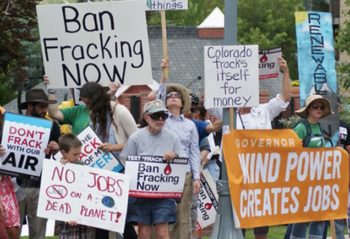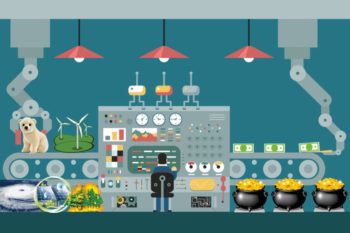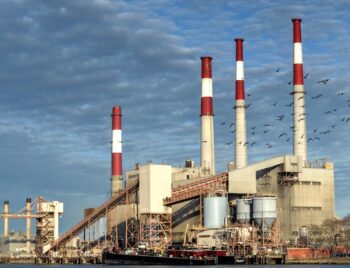
Senate Minority Leader Chuck Schumer, D-N.Y., spoke earlier this month at a gas station in Manhattan and lamented, “Gas prices are going up and up and up,” describing the phenomenon as “something really bad for average families who are struggling to make ends meet.” Sen. Ed Markey, D-Mass., has gone so far as to call for the reinstatement of the oil export ban.
Sen. Brian Schatz., D-Hawaii, went so far as to say that you can draw a “straight line” between the policies of President Trump and the prices we pay to fill up our gas tanks.
It’s peculiar to see Schatz bemoan rising gas prices because one of his pet proposals would cause gas prices to rise by design. Schatz has long supported a carbon tax. His latest effort is the American Opportunity Carbon Fee Act of 2018, which he sponsored alongside Sen. Sheldon Whitehouse, D-R.I.
A carbon tax is a fee levied on the emission of greenhouse gases, with the purpose of raising gas prices and nudging our economy away from the reliable and plentiful energy provided by hydrocarbons.
According to carbon tax theory, by elevating the cost to consumers of burning hydrocarbons in the form of coal for electricity and oil for transportation fuel, policymakers can spur the development of competing energy sources, like wind and solar, that have hitherto been unable to match the affordability and performance of hydrocarbons.
So Sen. Schatz’s proposal would assess a tax of $49, set to increase by a real 2 percent annually, per ton of carbon dioxide.
For concerned drivers, that means a price hike at the pump of more than 20 percent, according to an analysis done by Resources for the Future.
So while Sen. Schatz complains that gas is again creeping above $3 per gallon in many parts of the country, he is simultaneously calling for an additional 60-cent price hike.
And because energy expenditures naturally make up a larger portion of low-income families’ spending profiles than high-income families’, carbon taxes are regressive — i.e., hitting the poor hardest.
And, indeed, a carbon tax like the one proposed by Sen. Schatz would make Schumer’s concern about average families a certainty. A carbon tax really would cut the legs out from under them as they strive to climb the economic ladder.
In an effort to offset the carbon tax’s regressive effects, Schatz’s plan would include an $800 refundable tax credit and grant billions of dollars to Social Security recipients, veterans’ program beneficiaries, and others.
Though the intention of these benefits would be to mitigate the harm caused by the tax, this program would merely create a new entitlement class that would be incentivized to support the tax as a funding stream — not an emissions reduction plan — in perpetuity.
A carbon tax would not only entail higher prices at the pump, it would also almost surely be accompanied by more government spending.
When we see the price at the pump tick upward, we viscerally experience the adverse effect it has on our quality of life.
On some level, politicians like Schatz recognize the value that inexpensive fuel provides to Americans and share in our discomfort. Yet Schatz and his fellow travelers also advocate policies that would make the situation worse.
A carbon tax is a deliberate attempt to coerce energy consumers — which is to say, all of us — into a less comfortable, less convenient lifestyle.
It would necessarily increase the cost of gasoline with the explicit purpose of nudging Americans away from the modes of transportation they prefer.
If Schatz were to join us in championing affordable gasoline, we would welcome him as an ally, but one cannot credibly do so while simultaneously advocating for a tax to upend our energy economy.
Jordan McGillis is a policy analyst at the Institute for Energy Research.
Read more at Washington Examiner

















We need to remember that one of the original goals that got the global warming fraud started was the desire for excuses to implement new taxes.
This article was just talking about gasoline. Remember, a carbon tax would be applied to natural gas, propane, and heating oil. It would also be applied to fossil fuels used to generate electricity. The saying “If you got it, a truck brought it.” is true. Trucks run on fuel that the carbon tax would hit. Deliver costs would be higher and these would be passed on the consumer, meaning all of us.
A carbon tax is quick sand to the poor and middle class . Keep the poor and middle class down and you control their vote … for a while . Then the nooses come out for the politicians and the 1 percenter’s so keen on cake .
Let’s not forget Schumer’s pal Obama bragged about jacking up the cost of energy .
Let’s see now the people that fought for the retention of slavery now think it’s a good idea to put coal workers out of work and shake down the poor and middle class with a great big fuel tax while claiming to be the peoples party .
Increased fuel prices are wonderful if the money goes to politicians, who did nothing whatsoever to earn it, but terrible if the money goes to the people who risked their capital to find it, produce it and deliver it to an ungrateful public.
Vehicle fuel costs are driven by two things, federal/state/city taxes and the market. Crude prices/refinery maintenance/refinery incidents are all part of that market. When demand increases, supplies are reduced and prices go up as demanded by the marketplace.
Cuck_E-Sleaze(Schumer)and Schatz both members of the Tax & Spend Democ-Rat party and as privlaged Liberal Democrats they dont pay for the gasoline for their gas guzzling limos its the Tax Payers left footing the bill